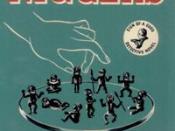If one's actions cannot be prosecuted under the normal proceedings of law, can one be considered innocent of any wrongdoings even though the actions in question are morally unjustified? In Agatha's Christie's And Then There Were None, the idea of justice is a major theme and is thoroughly explored through the context of the characters. Trapped on an island and distanced from society, the characters in the story are forced to come to terms with their past actions as they wait for their "death sentence". Justice Wargrave is the administrator of the law and the killings on Indian Island are merely prosecutions where the guilty are brought down in the name of the law and thus, enforcing justice.
The administration of justice is a common theme in many murder mysteries. An individual commits a crime, and it is only a matter of finding that individual and punishing them through the law.
Agatha Christie, however, departs from this formulaic approach by introducing the characters to offenses which are not punishable through any normal means. Wargrave's overwhelming desire to instil justice, therefore, leads him to deviate from the norm and punish those who he deemed guilty through his sick and gruesome way. He presents himself as the fighter of injustice and entrusts himself with the role of punishing those who had escaped the consequences of the law. The traditional sense of justice, however, remains the same. Wargrave, in his conventional role as a judge, enforces justice by sentencing the guilty to prison or execution in the court room. Similarly, Indian Island serves as a court room for Wargrave, and the ten "Indians" are the defendants who are waiting for Wargrave's pronouncement of their death sentence.
It can also be argued that the murders of some of the characters...



The Application of Justice
The writing in this essay is reasonably good, but the reasoning is, at best, questionable. The writer fails to present the plot of the tale adequately. Ten people come to an isolated island where they gradually determine that one among their number is killing them one by one in retaliation for their supposed past crimes. Each of these people was responsible to some degree for the death of another person, but it is a grotesquely severe sanction that the killer meets out, making himself judge, jury, and executioner, over a range of cases, virtually none of which could qualify as "murders" while everything that the vengeful killer is calculated and cold-blooded. Is this justice? The killer, a retired judge, seems to justify himself with the simple notion that because he will take poison to hasten an advanced cancer, he does nothing wrong in killing nine other people. It is a shallow and simplistic line of reasoning and one that this writer has failed to consider properly. If these killings were carried out in real life, rather than in the context of an isolated island, would the writer have any real admiration for the killer?
0 out of 0 people found this comment useful.